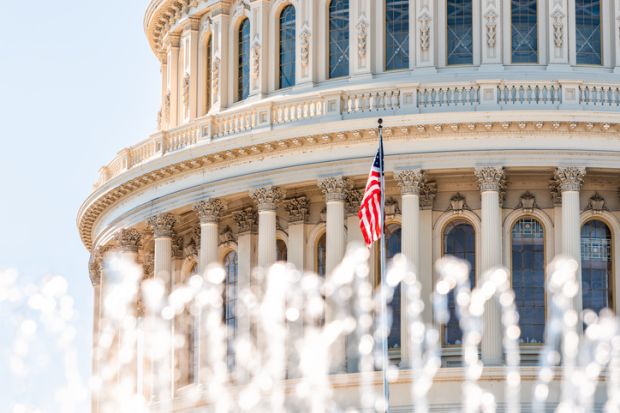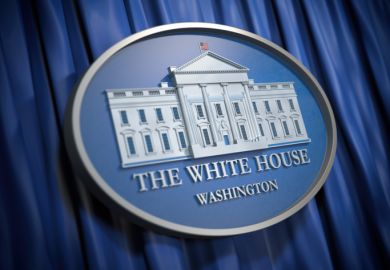The US House of Representatives has approved a $350 billion (£260 billion) bill to expand the National Science Foundation, welcome overseas scholars with scientific expertise, and boost competitiveness with respect to China.
The Democrat-controlled House approved the America Competes Act by a nearly party-line vote of 222 to 210, leaving the measure to face reconciliation with a $250 billion Senate-passed version that took an even more confrontational stance towards China.
Both measures contain a variety of investments and policy changes aimed at improving US research and economic competitiveness, with broad implications for US higher education, including the creation of a new NSF directorate aimed at converting basic research discoveries into products. US university groups largely back the efforts.
The House and Senate bills both include language aimed primarily at China that largely would bar federal science grant recipients from working with research programmes in certain adversarial countries. They also would tighten requirements for US-funded scientists to disclose any foreign support, while adding consistency in those rules across funding agencies.
The nearly 3,000-page House measure, however, also contains numerous differences – in higher education policy and beyond – from a similar Senate bill passed last June by a vote of 68 to 32.
Those differences include a Senate requirement, not in the House bill, for governmental reviews of many foreign gifts or contracts with higher education institutions that exceed $1 million. The Senate version also would require the NSF and the Department of Energy’s science office to spend at least 20 per cent of their research funding in states that historically fare poorly in its competitive award competitions.
Leaders of the US Senate – with a narrower Democratic majority – have explicitly characterised their bill as a response to what they see as a military and economic threat from China. House leaders have acknowledged anti-China motivations while casting their effort more as an attempt to help their nation’s own well-being and global competitiveness.
“We are acting”, said Representative Eddie Bernice Johnson, chair of the House Science Committee, “to address the critical needs identified by the scientific community, industry, academia and other stakeholders as to what they need most to succeed in the 21st century.”
House Republicans criticised the effort, largely with the accusation that it represented a concession to China.
US President Joe Biden, following the House vote, urged lawmakers from both parties and both chambers in Congress to find compromises that could allow a final version of their bills. “National security leaders from both parties have said that the investments in this bill are needed if we want to maintain our competitive edge globally,” Mr Biden said in a statement.
Other provisions of the House bill would increase funding to help early career scientists, diversify the nation’s scientific workforce and bolster science education programmes.
The House floor debate added some 200 amendments beyond those accepted during the committee process. One expanded a provision making doctoral graduates in science and technology fields eligible for permanent US residency, by widening the range of eligible fields and by making a master’s degree qualify in some instances. Another created a visa category for scientists and engineers with value to national security. Another restricted federal grant eligibility for applicants involved in sexual harassment cases.
The only House Republican to vote in favour of the bill, Adam Kinzinger of Illinois, is also a leading critic of former US president Donald Trump. The only Democrat to vote against it, Stephanie Murphy of Florida, warned that the measure would need substantial changes to pass the Senate, especially in areas that include fighting social inequities, climate change and human rights abuses.
Register to continue
Why register?
- Registration is free and only takes a moment
- Once registered, you can read 3 articles a month
- Sign up for our newsletter
Subscribe
Or subscribe for unlimited access to:
- Unlimited access to news, views, insights & reviews
- Digital editions
- Digital access to THE’s university and college rankings analysis
Already registered or a current subscriber?








